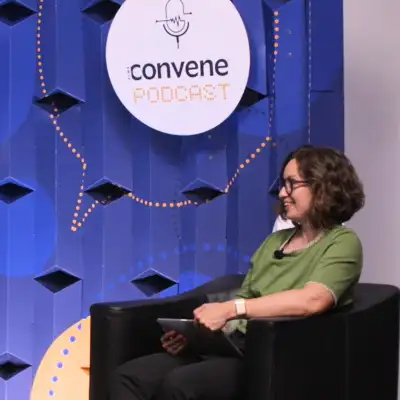Creators and Guests
What is PCMA Convene Podcast?
Since 1986, Convene has been delivering award-winning content that helps event professionals plan and execute innovative and successful events. Join the Convene editors as we dive into the latest topics of interest to — and some flying under the radar of — the business events community.
Convene Talk, ep. 82/October 10, 2025
*Note: the transcript is AI generated, excuse typos and inaccuracies
Magdalina Atanassova: This is the Convene Podcast.
Welcome to another Convene Talk.
Today we are going to talk about the 2025 salary survey,
the results of which we shared in the October issue, Now available on pcma.org the goal is to benchmark industry standards in terms of compensation,
but we also try understand what are the drivers,
challenges and how can planners view their work.
One metric that has remained consistent over the last few years is a small gap between planners perception of how well they are compensated versus how satisfied they are with their job and the events industry as a whole.
In short, planners are satisfied with the industry a little less with their job and then the dissatisfaction with their current salary is more notable.
One key insight here the lowest satisfaction levels, both job and professional,
are reported by those who assumed additional responsibilities due to staffing losses.
This reinforces the strain of workload increases without formal recognition or compensation or ability to control their workloads.
Important to mention is also that respondents who took on more duties for positive or strategic reasons like growth promotion or interest report higher satisfaction,
even higher than those whose roles remained unchanged.
This suggests the power of agency.
While we go in depth into the point why this salary dissatisfaction is an ongoing factor in our industry,
I also noticed how open planners were when it came to new job opportunities if they presented themselves.
Recently, half of planners said they would be open to a move if a good opportunity presented itself,
which makes me curious about loyalty and how much the compensation plays a role here.
That of course is a huge topic, probably worth another cover story in itself.
So let's start with what we had in the issue.
Michelle, you explored a lot the topic of compensation in similar roles.
Would you share a bit more about it and what surprised you in this process?
Michelle Russell: Sure. Maggie, thanks.
You know, I wish I could say that I found a definitive answer for this, but when I did research online to see first of all,
it's difficult to say what is a comparable role because meeting planners do so many different things and what they do really depends on the organization they work for, how well staffed it is, how many meetings there are all of those things.
There are just so many factors that play into someone's role and their compensation.
But I thought initially, okay,
let's just isolate associations and let's say maybe if we looked at membership directors, it's somewhat similar only in the respect that both roles are responsible for generating revenue for the association.
So it looks like if I went to I went to a number of different sites,
the difference between a membership director and a meetings conventions director is actually in the favor of the meetings conventions director by only a couple thousand dollars.
One of the surveys I looked at was the ASAE association and Compensation and Benefits Study for 2024, 2025.
And according to their research,
membership director median is 110.
Meetings conventions director median is 114.
And then a marketing director who is a little different. But in corporations,
events are usually fall under marketing, it's 111.
So if you look at that, you would say they're really being compensated in line with other comparable positions.
But when you look at the lower levels of meeting planner, not a director level, but say a management level,
it's in the 60s for a number of sites like Indeed Glassdoor,
ZipRecruiter and Salary.com in fact, Salary.com, it's in the 50s.
And when I spoke with Angelica Barzernick, who is doing her PhD research on stress in meeting planners,
she said if you look at that median salary and you look at what McDonald's managers make,
it's comparable. And that's where she could see a meeting planner being frustrated, feeling like they're not well compensated because as she pointed out, somebody who works at McDonald's has a pretty stable responsibility, like one day is not going to change all that much from the next.
Whereas she said when you're planning a meeting, every meeting is really different and unique.
And so that's where she thinks some of the dissatisfaction would come in.
She mentioned project managers, and I think that's also a comparable role because certainly that is what meeting planners do, is they manage a huge one or more huge projects.
And the interesting thing she said is in terms of the stress level, you could be a project manager for say, a construction site and that that deadline can keep moving,
whereas the deadline for a meeting cannot move. It's fixed. And so that is where a lot of the stress comes in.
So I wish I could say oh definitively there's a reason why planners feel they're not as well compensated as their peers who are doing similar work. But it's really so dependent on many different factors.
But I think it's still worth the conversation and still worth exploring.
And I do think it speaks to what you said, Maggie. A lot of planners also feel like they don't have a seat at the table, that their work is not recognized, and that they may be the ones who are very dissatisfied, are having additional responsibilities put on their desk,
and they're still not getting the recognition they deserve and nor are they getting the compensation they should be entitled to.
Magdalina Atanassova: I feel That's a very common thing in surveys that we catch people where they are.
So if they're experiencing a current dissatisfaction in their role in any shape or form, this will show in the surveys. We need to point that out that it's this point in time.
Yeah, they said that and that may have changed, but again,
that's how surveys work. Barbara, what do you think?
Barbara Palmer: You know, I think what that last point you made, Michelle,
about feeling that your role is respected, that you have autonomy,
that you're able to work without a lot of micromanagement and get the resources that you need,
not just for yourself but for what you're trying to do would really impact job satisfaction.
I think it's striking how much meeting planners love their jobs.
And just that's been my experience.
I don't talk to a lot that are neutral about it.
I mean they really love it.
Just in the last couple of months, this book, I don't think it's out yet, I got an advanced copy of a book called Work How You Are Wired.
It's 12 data driven steps to Find a Job you Love. It's by William Vanderblum.
And he took a whole bunch of indexes of personality and satisfaction and develop this framework. And the point that I'm getting to is that there's something he defined as the agile person.
And one of the jobs that the agile tend to take is meeting planning and event planning.
And what struck me is that this agile view of the world really wants opportunities to learn. They're very resilient, adaptive, adaptive.
They're open to new ideas, they like to take risks,
they want to solve problems.
And so you just think if you're in a job where you know, you just don't have the agency to do what you want. We've read all of those comments that meeting planners, when they say what do you love most about your job?
It's like seeing the end result.
It's so creative. And so it's like mixes that creative problem solving on a deadline.
And if you see what needs to be done and you just don't have the ability to make it happen or you're being asked to just do it under just impossible circumstances, it can be really frustrating.
This book also talked about when people find that agency that combines with their values and their passions. And we've met those meeting planners like they are so fulfilled and pushing forward.
So anyway, I thought it was very interesting.
I see that gap,
you know, between what you want to do and what you feel like you're seen as being able to do and have the ability to do it.
Michelle Russell: I think that there isn't, if you look at the survey results, there isn't a huge difference between people's level of satisfaction with their job and with the industry in general. I think I agree like it's high, they like what they do.
And we hear constantly in the open ended comments no two days are ever the same. I think people relish that in this industry to continue to be creative and innovative.
But where we see the dip again is the salary. So it's satisfaction with I'm doing all of this, but am I really being compensated enough for having that drive, for having that creative spirit for all of those things that they're doing that makes them happy,
just not happy in terms of their paycheck.
Barbara Palmer: I was struck though by the data about the overall satisfaction with your salaries that people tend to be dissatisfied.
And it could also have to do with the economic moment that we're in that, you know, inflation,
housing costs going up,
you know, if, if the planners are younger, like I, I gotta get serious. How can I,
how can I buy a house?
So I feel like some of the factors might be coming from outside the industry that make people dissatisfied.
Jennifer N. Dienst: I agree with you Barbara. It feels to me like those lower salary numbers are probably,
you know, what people who are early career are making. And that's not unusual I think for a lot of industries. I mean that's quite similar I think to journalism,
if you can even find a job in journalism anymore. But like that's you know, pretty commensurate.
But the other, the other thing that struck me too is that woman, Angelica Bazarnick,
some of her comments about comparing to working at McDonald's or I think people want to like kind of poo poo that a little bit. But the end of the like it's F and B like it's running a restaurant and like I don't think it's that automated.
I have a lot of friends who work at F and B and I actually think it's quite challenging. I mean I think, I don't know if you have ever seen a BUCEE's a gas station that's quite popular in the south and I think there's more and more popping up.
But they're kind of famous because they advertise their manager positions and they're in like 120, 130k a year which is quite high. But if you've ever been to one, you would know why, because it is complete chaos.
And I was actually talking about this last night. So I think those jobs actually do quite have a lot of similarities. You know, like at a restaurant there, no two days are the same.
You've ****** off customers, angry customers, event planners, know what that's like.
Things break,
your, you know, your shipments don't come in. Like there's all sorts of things, I think that are pretty similar.
So I don't really agree with her there. I don't think that those two things are that dissimilar.
I haven't worked in F and B, but I'm surrounded. I have a lot of friends, people close to me who are in that field and I see how stressed they get and you know, and they work in other fields too, that are quite stressful.
So it's not, you know, I think they're pretty balance in the way they look at it. But,
but yeah, I, I thought that,
you know, that was a little off. But yeah, I don't, I don't blame them for wanting more. I mean,
in this day and age six, you know, 60s, 70s, it can be pretty tough, especially depending on where you live.
Michelle Russell: So it depends on where you live, for sure. Yeah.
Barbara Palmer: Yeah.
Magdalina Atanassova: Something else that I also looked at and I, I'm always curious about our credentials and continued education,
which we address in the salary survey.
And I feel these are very tight, especially the credentials to location.
So in the US some of the credentials that we list in the survey have more meaning than in Europe and other places around the world.
So I was, I'm always curious to see how they rate.
We do have most of our respondents coming from the US so. So it's a bit harder to compare and see,
you know, the real picture between Europe and the States. But I was surprised this time. We asked the exact amounts that people get to spend on continuing education.
So that was a number that was good to understand and see more of. And even though there is support from companies for event planners to attend events and to get their.
For their education,
a lot of planners still pursue that on their own and support themselves. And while it's normal, you know, in today's day and age, because everything's changing all the time,
still it has to be noted because with such a very stressful job where you have a lot of things to balance,
finding time to also educate yourself and keep up with chance is,
Is admirable. And I think we should celebrate our industry for being there and doing that.
Michelle Russell: Agreed.
Magdalina Atanassova: And I hope we support the industry with our work. Of course, they can just read one of our articles or listen to the podcast and get the same kind of takeaways,
I hope.
Michelle, do you have anything else to add or should we wrap up?
Michelle Russell: What we saw this year is that more planners said that they do have a budget for continuing education, which is a good thing compared to last year. And,
you know, I don't think we can overstate the fact that a lot of the meetings that they convene are continuing education.
So it just.
It makes sense for them to feel like if you believe in that and that's part of your mission as an organization, you should also be able to support planners in their professional development.
Magdalina Atanassova: Yeah, absolutely.
And I hope there is a clear distinction.
Right.
What are you getting out of a conference when you send somebody to attend versus a dedicated education certification or anything of that sort? Because it's quite different.
So while we mix up the question for the sake of to keep the survey shorter still,
it's important to note that they are quite different.
I'll just leave a link to the October Ish so people can read and see more about our findings.
Michelle Russell: Can we talk for a second about the art? Because I think that's fun.
Magdalina Atanassova: Absolutely.
Michelle Russell: So this was a tough one because we rarely conceptualize a planner with a particular emotion. And this time we chose an artist who did that,
and we tried to kind of convey what planners are feeling in the moment.
I think the interior illustration, which is lovely,
I still feel she looks a little too calm and happy as opposed to. Because you could see she's behind the scenes at a general session or a major session,
and she's on the phone.
I was hoping that she'd look a little more intense, but it's hard to have the illustrator to give art direction to an illustrator.
But the one on the COVID I like her expression because it's sort of neutral, because I don't think our takeaway from this story is that planners are angry and they want better pay and they're ready to take to, you know, the streets to protest.
I think it's their wondering. And I like the expression on her face on the COVID because she's wondering, am I getting paid what I'm worth?
And I think that's a question all of us, if not every day or at least once a week, we ask ourselves,
am I. Am I really getting paid for all of this challenging work that I do?
We never talk about the art, and I feel like it's such an important part of the magazine.
Maybe we do a session,
a podcast, where we talk about the whole process for picking an artist and what and the back and forth, how we decide what the right cover line should be.
I think that's a fun thing we should do.
Magdalina Atanassova: Yeah, absolutely. Okay. Thank you all for the conversation.
Remember to subscribe to the Convene Podcast on your favorite listening platform to stay updated with our latest episodes. For further industry insights from the Convene team, head over to PCMA.org/convene. My name is Maggie. Stay inspired. Keep inspiring. And until next time.



